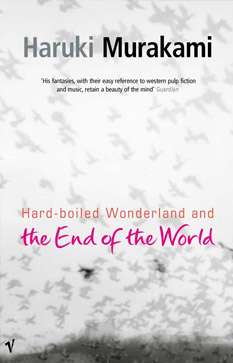Hard-Boiled Wonderland and the End of the World by Haruki Murakami
I wasn’t sure of anything at the beginning of Haruki Murakami’s Hard-Boiled Wonderland and the End of the World – what the story was about, where Murakami was going with it, even who the main character was going to be. And I don’t mean I was confused after the first few sentences or even after the first few paragraphs… I was still lost after the first few chapters. I actually entertained putting the book aside for a while but after the initial “huh?” factor, it did start to make sense. A very strange, convoluted sense, but sense nonetheless. And it quickly grew into something involving and evocative.
The story: an unassuming computer tech with the ability to crunch data in a very specialized way takes a side job and finds himself caught between corporate espionage and a rogue scientist. It turns out he has been a pawn for longer than he realizes – and the outcome of this knowledge could trigger the end of the world as he knows it. But that simple summary doesn’t do justice to what’s really going on. It doesn’t mention the Town behind the Wall, the INKlings, the unicorn skulls or the chubby girl in pink. Or the significance of paper clips. Or the laboratory in the colon of the earth. Not to mention how long a shadow can survive on its own.
Understatement and grace are hallmarks of Murakami. Characters in this story have no names – not even the main character. Some have titles – the Gatekeeper, the Librarian – but no proper names. Yet the non-naming convention feels comfortable, as if names would make the action too precious, too sensationalized. Despite all the weird, complicated, extreme things that happen in this book, none are delivered in a sensationalized or dramatic fashion – everything comes at face value, with believable responses and stream-of-consciousness musings that make the actions seem plausible.
Yes, Hard-Boiled Wonderland and the End of the World is not an easy read. Some of the basic concepts in the book, such as “laundering” and “shuffling” data, were difficult to comprehend, but I was able to grasp enough to keep a toehold in the story. In fact, I grew to enjoy how gentle Murakami was with the challenges in this work; he didn’t throw them at me – he unfurled them, without fanfare, confident that I would “get it” enough to stay engaged – and I did.
If you like your fiction to be challenging and ultimately extremely rewarding, pick up a copy of Hard Boiled Wonderland and the End of the World. Then clear a few nights off your calendar so you can completely engross yourself in it. You’ll need that isolation to start off, and you’ll want it the further you get into the story. When you’re done, you’ll actually feel more connected to not only what is, but what might be, both in this world and in the one that might just exist in your head. And that’s a good thing. You owe it to yourself to experience this story, and the accomplishment it is to follow it to its unsettling but somehow just conclusion.
—Sharon Browning

